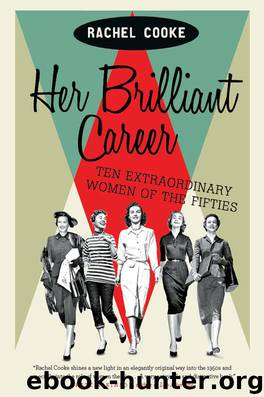Her Brilliant Career : Ten Extraordinary Women of the Fifties by Cooke Rachel

Author:Cooke, Rachel [Cooke, Rachel]
Language: eng
Format: mobi
Publisher: HarperCollins
Published: 0101-01-01T00:00:00+00:00
Ann Todd in The Seventh Veil
(ITV Global/The Kobal Collection.)
The Seventh Veil opened on 22 October 1945 at the Leicester Square Theatre; its title and the names of its stars could be written in lights, thanks to the end of the black out. Muriel, ever the pessimist, did not have high hopes for the film. She doesn’t explain the source of this gloom in her memoir, or in any subsequent interview, but perhaps it was its ending that made her nervous: after receiving psychiatric treatment, the film’s heroine, Francesca (Todd), realises that the love of her life is her crippled and Svengali-like guardian Nicholas (James Mason), a romantic revelation mottled with incestuous and masochistic undertones. Even with Mason in the role – he had been Britain’s most popular box-office star in 1944 – this was risky. But whatever the cause of her anxiety, she was quite wrong to doubt it. The film, which won the Oscar for best original screenplay in 1946, was loved by the critics and public alike; as Muriel would put it in Odd Woman Out, ‘with almost monotonous yet very comforting regularity, it broke every known record’.*
It had cost only £92,000 to make.
No wonder Arthur Rank now asked Sydney to take charge of production at Gainsborough Studios.
It was Noël Coward who – following their takeover at Gainsborough – described the Boxes as ‘the Brontës of Shepherd’s Bush’. But while this was both delightful and very neat, it was not entirely accurate. Betty Box, the member of the family for whom the Gainsborough years would prove to be most successful, worked not in Shepherd’s Bush but at the studio’s Islington outpost, where Sydney had appointed her the studio head.
This was a shrewd move. Rank had contracted him to make ten to twelve pictures a year, with budgets of between £150,000 and £200,000 apiece; Islington’s output would need to comprise roughly a quarter of this total if he was to meet these obligations. He needed to be sure its stages were productive, and what better way of doing so than by putting his own sister in charge? At Verity, Betty had made over two hundred short films (her favourite of these, she liked to joke, was called: How to Use Dried Egg Powder for a Tasty Meal), and she had proved that she was hard working, tough, pragmatic and good with budgets. She was, it was generally agreed, the absolute mistress of the cheap special effect. Night-time shots being much improved by damp slates, which reflected the light, she had been known to call out the fire brigade to spray the roofs of buildings on her locations. The only member of the Gainsborough board to object to her appointment was Michael Balcon, who insisted that it smacked of nepotism. Betty, of course, didn’t buy this for a minute. ‘I believe that had I not been a woman, there would have been no objection at all,’ she wrote in her memoir Lifting the Lid.
Overnight, then, Betty Box became Britain’s leading female film producer – its only female producer – and at the age of just thirty-one.
Download
This site does not store any files on its server. We only index and link to content provided by other sites. Please contact the content providers to delete copyright contents if any and email us, we'll remove relevant links or contents immediately.
| Crime & Criminals | LGBT |
| Special Needs | Women |
We're Going to Need More Wine by Gabrielle Union(18082)
Bombshells: Glamour Girls of a Lifetime by Sullivan Steve(13119)
Pimp by Iceberg Slim(12946)
The Radium Girls by Kate Moore(10915)
Becoming by Michelle Obama(9299)
The Girl Without a Voice by Casey Watson(7271)
Educated by Tara Westover(7075)
Wiseguy by Nicholas Pileggi(4600)
The Wind in My Hair by Masih Alinejad(4427)
Hitman by Howie Carr(4382)
On the Front Line with the Women Who Fight Back by Stacey Dooley(4317)
Hunger by Roxane Gay(4232)
Year of Yes by Shonda Rhimes(4121)
The Rules Do Not Apply by Ariel Levy(3913)
The Borden Murders by Sarah Miller(3594)
Papillon (English) by Henri Charrière(3279)
Joan of Arc by Mary Gordon(3270)
Patti Smith by Just Kids(3234)
How to be Champion: My Autobiography by Sarah Millican(3193)
